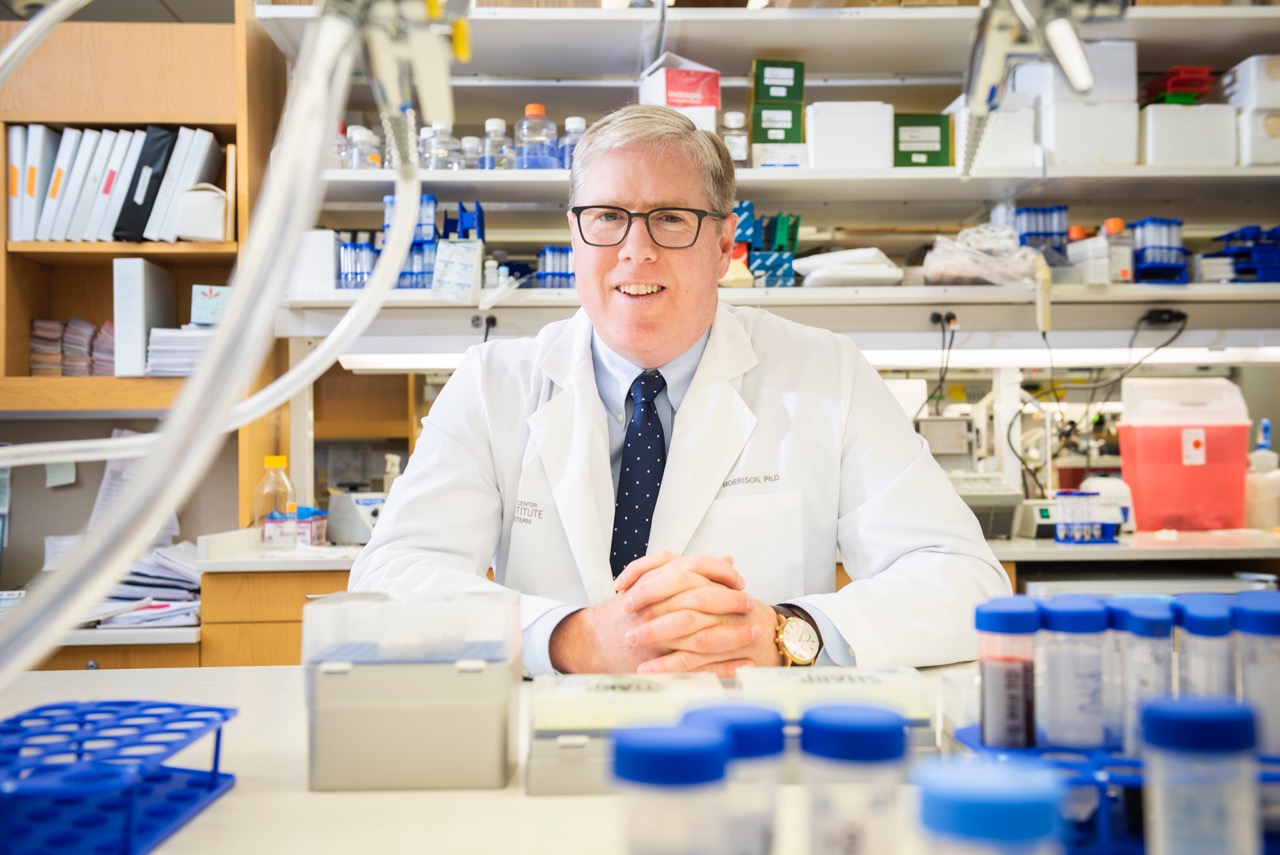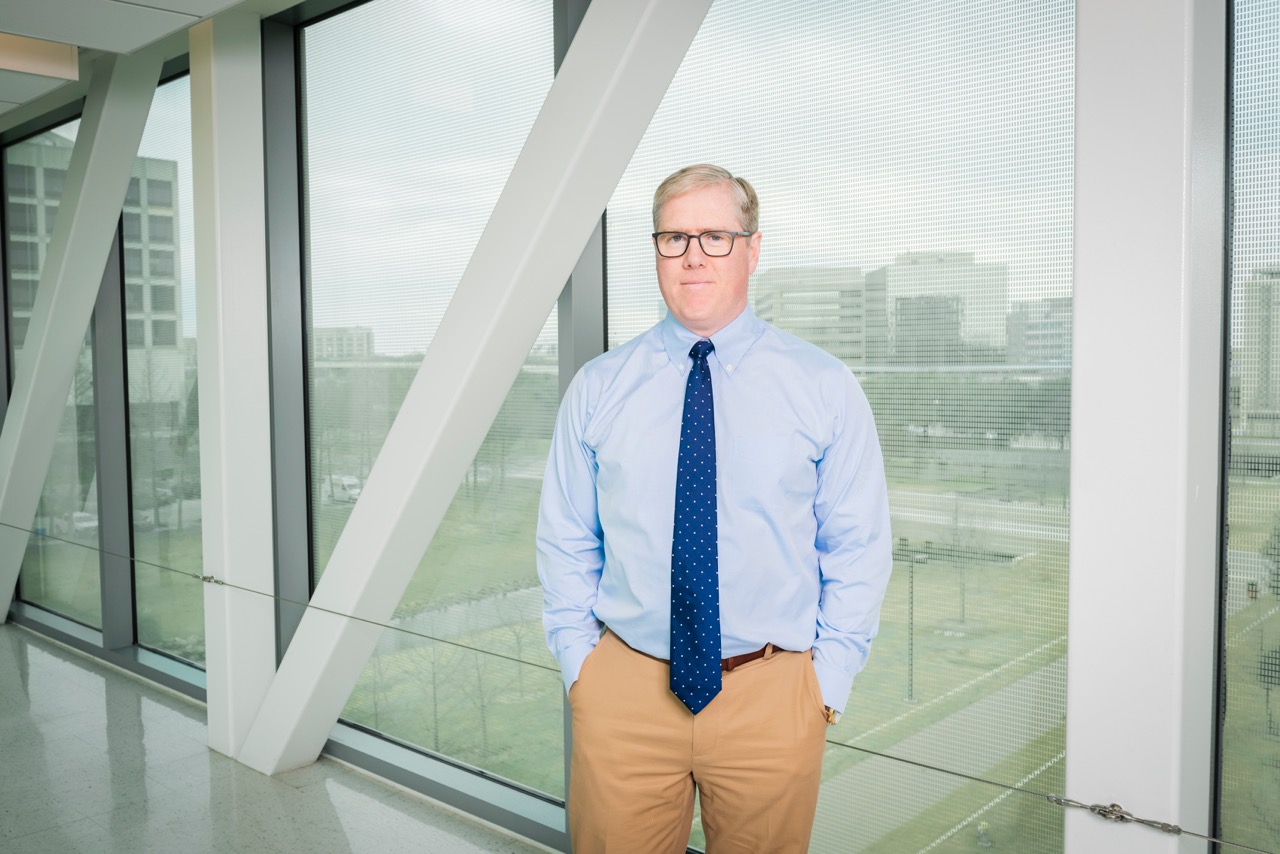Why Dr Morrison pays attention to his vitamin C intake
Internationally recognised leader in stem cell research, Dr Sean Morrison, makes sure he gets his daily requirement of vitamin C – not a lot more and definitely no less!

Why? Because his research has discovered a connection between vitamin C levels and leukaemia, and the importance of meeting daily requirements as opposed to taking megadoses.
Dr Morrison is director of the Children’s Medical Center Research Institute at UT Southwestern*, Dallas (U.S.). He was in Brisbane in 2019 to present at the International Society of Experimental Haematology (ISEH) meeting where he spoke to AML News.
His lab focuses on the blood forming system and studies stem cells in cancer.
“We study the mechanisms stem cells use to replicate themselves, which is how they persist throughout life in our tissues, and the ways in which cancer cells hijack those mechanisms,” said Dr Morrison.
“Cancer is a disease of dysregulated self-renewal, where cancer cells hijack the mechanisms that stem cells use to self-renew and over-activate those mechanisms to form tumours rather than normal tissues.
“We are trying to improve the treatment of disease, including cancer, by better understanding the underlying biology.
“Anything that promotes those mechanisms is a potential regenerative medicine therapy, and anything that inhibits those mechanisms is a potential anti-cancer therapy,” explained Dr Morrison.
“We have done a lot of work to characterise the micro-environment that maintains stem cells in the bone marrow.
“There are specialised cells in the bone marrow that help to maintain blood forming stem cells.
“One thing leukaemia cells do, is eliminate the normal cells partly by destroying those niche cells that help to maintain the normal cells.
“We discovered these leptin receptor positive cells that are the main source of factors that promote the maintenance of stem cells.
“Cancer cells kill off those normal leptin receptor positive cells and the normal stem cells, and by eliminating the competition from the normal cells it helps the leukaemia cells to progress more quickly,” he said.
Understanding the metabolic regulation of stem cells is another area of Dr Morrison’s research.
“We are looking very widely at whether there are metabolic pathways that are active in stem cells, more so than in other cells, and whether those pathways could be involved in supressing the development of leukaemia. And we found that they are,” he said.
“It turns out that haematopoietic stem cells take up more vitamin C than other haematopoietic cells.
“They have to take up vitamin C to regulate normal gene expression in the stem cells.
“Part of what vitamin C does is that it suppresses the development of leukaemia from blood forming stem cells.”
“You’ve heard your whole life… eat fruit to suppress the development of cancer,” said Dr Morrison.
“There were old epidemiological studies done, where it was seen that people with below average vitamin C levels get more cancer, but the underlying mechanisms were not at all clear.
“We’ve discovered some of the underlying mechanisms, where there is a particular tumour suppressor, called TET2, in the haematopoietic system that gets mutated in a lot of leukaemias.
“TET2 function requires vitamin C, and vitamin C is limiting for TET2 function,” he said.
“So, people who don’t get enough vitamin C in their diet don’t have adequate TET2 activity and they’re walking around with messed up stem cells in a way that predisposes them to leukaemia.
“That research has been published in the journal, Nature, and we’ve continued to refine and develop these methods for studying stem cell metabolism.”

Dr Morrison said another exciting discovery in recent years is that clonal haematopoiesis is more common than originally thought. This is where a haematopoietic stem cell (HSC) acquires mutations that allows it to outcompete normal HSCs and it starts to take over blood cell production.
“Normally, thousands of blood forming stem cells contribute to blood cell production, but as you get older, or if you have been treated for cancer, a surprisingly high fraction of people have clonal haematopoiesis.”
Dr Morrison said that by age 70, at least 10% of all people have clonal haematopoiesis, and about 30% of people who have been treated for cancer – who have received radiation therapy or chemotherapy – have clonal haematopoiesis.
“We are talking about a lot of people in the Western world, most of whom have no idea they have clonal haematopoiesis.
“This is a pre-leukaemic condition and in addition to increasing their risk of leukaemia, it predisposes to other diseases of aging, like cardiovascular disease,” said Dr Morrison.
“The people who discovered clonal haematopoiesis think the existence of this condition, along with the loss of TET2 function, causes the blood forming system to become more inflammatory.
“Inflammation makes us old and causes the changes that occur during aging.
“One of the most common mutations – the second most common mutation in clonal haematopoiesis – is loss of one allele** of TET2.
“While most people with clonal haematopoiesis never develop leukaemia, it is just a subset.
“We think the people who are most likely to develop leukaemia are those who have not only lost one allele of their copies of TET2, but who are also not getting enough vitamin C in their diet. If you are down to one good copy of TET2, you better get 100% of your daily vitamin C requirement in order to maximise the leukaemia-suppressive activity of the copy of TET2 that you have left,” he explained.
“And we know there is a dosage relationship, that the more you reduce TET2 activity, the more likely you are to get leukaemia.
“We are testing that in patients now, by offering to test vitamin C levels in everybody with clonal haematopoiesis. We are collecting that data over time to test our prediction that people with lower levels of vitamin c are more likely to progress to leukaemia.
“If it turns out that we are correct, and we can predict who is going to get leukaemia and who is not, based on their vitamin C levels, then it could have a major public health impact to insist that everybody with clonal haematopoiesis drinks a glass of orange juice every day or takes a multivitamin to ensure that they get 100% of their vitamin C.”
Dr Morrison said testing for clonal haematopoiesis involved sequencing and was not routinely done by doctors now.
“But I think, someday, it will start to be done routinely,” he said.
“In the future, when we hit 60 years old, or have been treated for cancer, we will be tested for clonal haematopoiesis. And then people will start paying attention to their vitamin C levels.
“After we saw from our experiments that blood cancer was particularly sensitive to vitamin C, we went back to the Centres for Disease Control and Prevention data and found that for most cancers, risk doesn’t change with vitamin C nutrition.
“There are only a few cancers that go up with low vitamin C and myeloid leukaemia is number one on the list.”
“If we could ensure that everybody with clonal haematopoiesis got optimal ascorbic nutrition, I bet we could cut down on the number (thousands) of people who would otherwise have got cancer,” he said.
So, does Dr Morrison pay attention to his vitamin C intake?
“Historically, I never did. I feel like I eat a pretty good diet. But after we published this paper, I was thinking that there are some days where I really don’t get 100% of my vitamin C, so I started taking a multivitamin.
“I don’t want people to misinterpret what I’m saying. I’m not suggesting people go out to the drug store and buy those megadoses of vitamin C,” emphasised Dr Morrison.
“I just think getting 100% of your daily requirement is good, and that doesn’t mean that 1000% is better. But getting 100% is good. That is why I take a multivitamin that has a little bit of vitamin C in it.”
Pre-COVID-19, Dr Morrison flew 200,000 miles (320,000 km) a year travelling the world to meetings like the ISEH meeting in Brisbane.
“I probably do travel too much,” he said.
“I prefer to be at home. It’s a healthier lifestyle to be at home, sleeping in your own bed, eating healthy food that you control, and getting exercise.
“But on the other hand, I almost never come to a meeting and feel like it’s a waste of my time.
“I learn something every time I come to meetings. I sit there, emailing questions back to people in the lab – ideas about doing new techniques or new ways of testing the things that we are working on. It does accelerate the science, and that undermines my willpower to say, ‘no’ more.”
Melanoma, in particular melanoma metastasis, is another area of study in Dr Morrison’s lab, which resulted in the discovery that melanoma cells are unusually sensitive to oxidative stress during metastasis.
“Let me give one piece of advice that your readers may not have heard elsewhere,” said Dr Morrison.
“The idea is so strong in people’s minds that antioxidants are good for you. For many years, there was this idea that if you ate antioxidants you would age more slowly and get less cancer.
“In fact, many clinical trials show that people who take antioxidants get more cancers, have worse outcomes with cancer, and are more likely to die of different causes,” said Dr Morrison.
“In our experiments with melanoma, we see that the cancer cells benefit more from the antioxidants than the normal cells do. If we take a mouse with melanoma and give it antioxidants, the melanoma progresses and kills the mouse faster.
“I worry that people who are diagnosed with a serious cancer and become very health conscious, then go to the drugstore and start buying all these supplements and antioxidants and things, are increasing their risk of dying because the cancer cells benefit more from the antioxidants.
“I’m not telling anyone to eat an unhealthy diet,” said Dr Morrison, who specifically mentioned people buying a pill that has 500% of the daily requirement of an antioxidant (vitamins A and E).
“In clinical trials, when people supplement their diet with large levels of vitamin A or vitamin E precursors, they have worse outcomes in terms of cancer.
“Now that people like us are finding the underlying molecular mechanisms, when combined with the earlier clinical trials that show worse outcomes, I think the scientific community is really flipping over to recognise that while it’s good to get 100% of your daily requirement of these things to be healthy, it’s not good to get 500%, especially if it is from a pill.
“If you eat a salad, those vitamins get released into your system over a period of time as you digest it. But if you eat a pill, your system gets blasted with these chemicals very quickly and the idea that if a little of something is good, more must be better, doesn’t turn out to be true,” said Dr Morrison, whose overall career goal is for a new therapy to emerge from his lab’s work that cures people who wouldn’t otherwise be cured.
* UT Southwestern is a premier academic medical centre in the U.S. that integrates pioneering biomedical research with exceptional clinical care and education.
** A variant form of a gene.